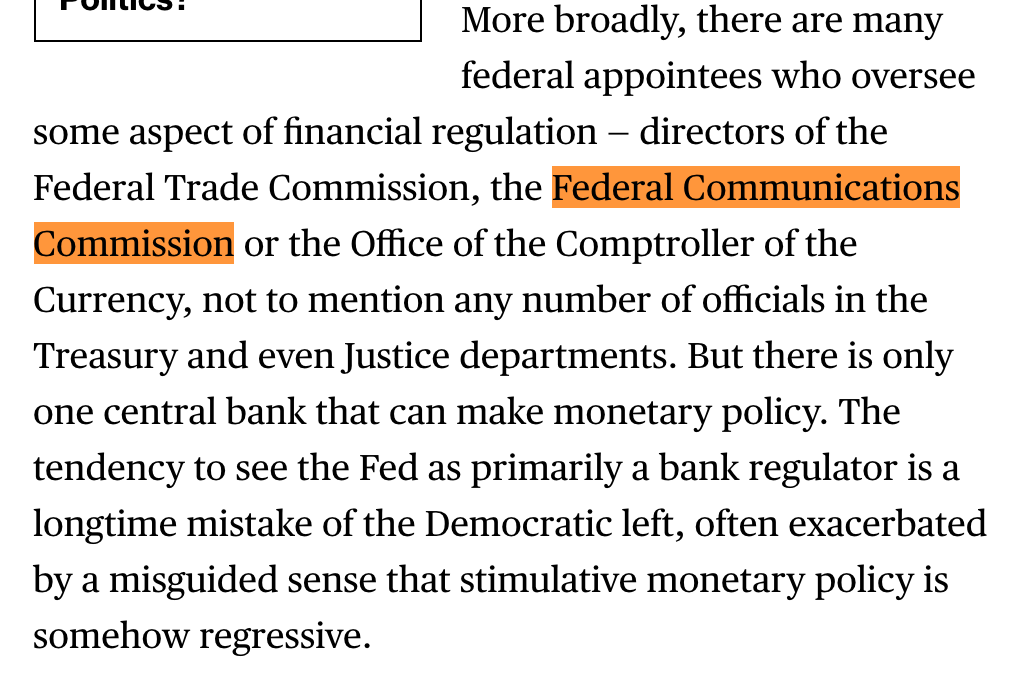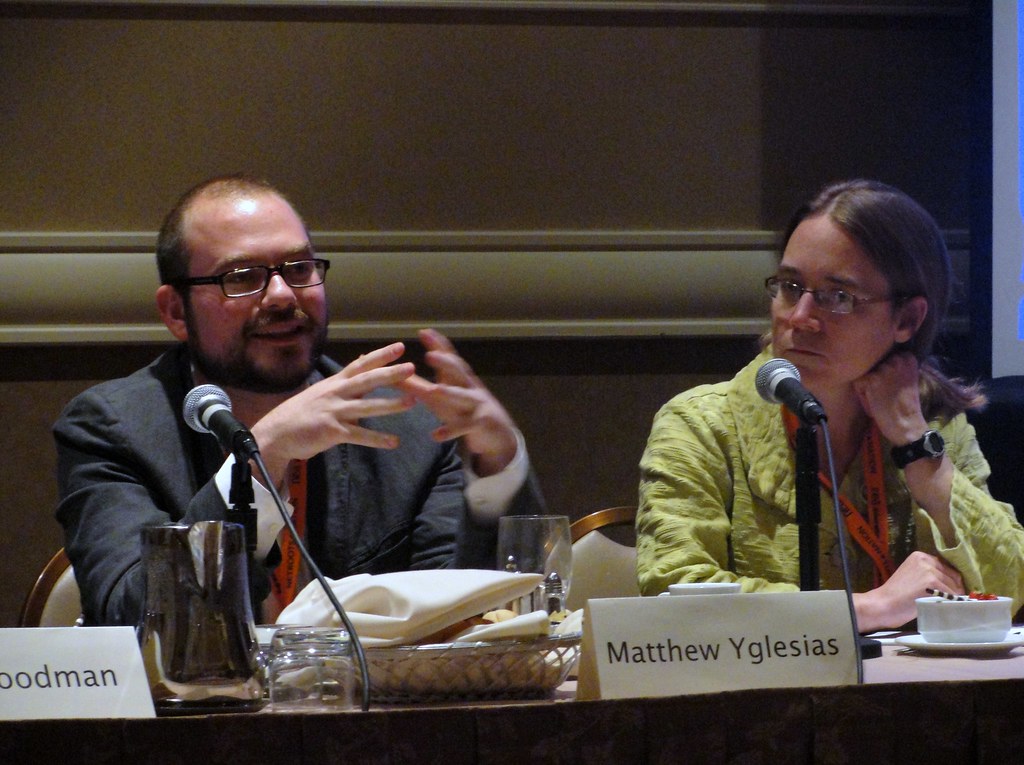The blogger Matthew Yglesias has spent decades cultivating a persona as someone who is savvy, policy-oriented…in a word, a wonk™. Reportedly, he is widely read by members of the President’s inner circle. And annoyingly, he has entered a debate which matters, and in which he is wrong.
In a Bloomberg Opinion op-ed (and a slew of tweets, some since deleted) Yglesias has endorsed renominating Jerome Powell for a second term as Chairman of the Federal Reserve. Or rather, he’s endorsed defying those who say Powell shouldn’t be renominated. As he admits, it’s quite possible to imagine better Fed chairs than Powell — he just thinks that “not only is the affirmative case for Powell strong, but the progressive case against him is weak.”
So let’s take Yglesias’ arguments on both counts. Because not only is the case against Powell strong, but the wonk™ case for him is lazy.
The Argument From Performance
Yglesias writes that “It’s not that Powell is irreplaceable — Lael Brainard, for example, would do an excellent job. But she can get the job in Biden’s second term, or move to Treasury when Yellen is ready to step down.” Brainard would make an acceptable Fed chair (especially since the Fed doesn’t touch trade), but it’s the height of arrogance to casually assert that Biden will both have a second term and have a Senate willing to confirm any of his nominees.
So if there are alternatives, what’s the case for Powell? “With an assist from fiscal policy, he helped guide what was almost certainly the world’s strongest and most robust economic response to the Covid pandemic,” Yglesias writes.
That’s quite a claim. The major evidence for it (which Yglesias doesn’t explore) is that Powell kept interest rates low in the middle of the worst economic downturn in living history — in other words, he did exactly what the macroeconomics textbooks say he should do. That’s not to discount his decision, it’s merely to point out that plenty of other potential Fed chairs would have done the same, including Brainard, Lisa Cook, William Spriggs, and Sarah Bloom Raskin. Evidence from the Yellen years indicates Powell mostly just votes in whatever way seems uncontroversial. It happens to be that good, dovish monetary policy is in vogue now.
Meanwhile, the other parts of the Fed’s coronavirus response were largely disastrous. Take the Main Street Lending Program, in which the Fed issued loans to struggling small-to-midsize businesses. Except it didn’t, since the loans started at a minimum of $1 million, vastly more than mom-and-pop shops could ever pay back once business returned. One month after the program shuttered in July 2021, Fed banks had $30 million in portfolio holdings from the program, which is .001 percent of the $2.3 trillion in loans allocated for this project. The Fed’s other lending program, to municipalities, was another major flop: city governments were the second-hardest hit industry by the pandemic; From February to October 2020, a staggering 1.2 million jobs were lost. But a grand total of two cities took the Fed loans offered to them, given how bad the terms were.
Powell has defended these failures by pointing out that direct lending (to businesses, not to governments) is a new activity for the Fed. But it shouldn’t take decades to know that a mom-and-pop shop can’t accept a $1 million loan. And if Powell’s decades in the private equity industry (in which his firm routinely preyed on vulnerable workers) didn’t teach him how to do finance for small companies, what good were they?
The Argument From The Voting Record
Speaking of finance, Yglesias thinks it’s unfair to criticize Powell’s Trump-era deregulatory votes, since “he did not dissent from any Yellen-era regulatory rulings.”
Cool. Well, once he was Chair, he voted identically to deregulatory maven Randal Quarles. I think his actions as Chair are more indicative of what he’d do as Chair. (On the subject of Yellen, let me mention that Powell’s monetary policy is largely a continuation of hers, yet he’s treated like the indispensable progenitor.)
Again, at best, Yglesias has shown that Powell’s regulatory policy goes whichever way the wind is blowing — which perhaps explains why Yglesias likes him so much.
As for regulation, according to Yglesias, “the solution there is a new vice chair for supervision.” Except Quarles doesn’t necessarily plan on stepping down in October. So while a new person may have the title, Powell’s running mate might remain as a Trumpian turd in the regulatory punch bowl. If Powell is renominated, Quarles will be all the more likely to stay, meaning that Trump appointees would have a majority on the Fed until 2026. Do Powell’s supporters really think that that deregulatory majority (or career staff, who report to the Chair, not a Vice Chair) will turn around and undo all of their work, just because a new Vice Chair for Supervision tells them to?
The Argument From Prioritization
Now we get to the crux of Yglesias’ case: that this is all so much bellyaching over something too small to care about. He writes “there are many federal appointees who oversee some aspect of financial regulation — directors of the Federal Trade Commission (FTC), the Federal Communications Commission (FCC) or the Office of the Comptroller of the Currency (OCC), not to mention any number of officials in the Treasury and even Justice departments. But there is only one central bank that can make monetary policy. The tendency to see the Fed as primarily a bank regulator is a longtime mistake of the Democratic left, often exacerbated by a misguided sense that stimulative monetary policy is somehow regressive.”
Where to begin.
Let’s start with this: No one in this debate sees the Fed “as primarily a bank regulator.” It is America’s central bank, and any hawkish nominee on monetary policy would get an immediate and vigorous “nay” from Powell’s critics. I have no idea where Yglesias got the idea that lefties find dovishness regressive, and never will, since he doesn’t cite a source.
But like it or not, the Federal Reserve is also the most powerful agency in the American financial regulatory system. This is true whether Yglesias or any other pundit cares about “finreg.”
And it’s clear that Yglesias really does not care about finreg. Case in point: his own op-ed. The FCC is not a financial regulatory agency, and it’s frankly surprising that Bloomberg would let an error that grievous go to print.

Much more important, though, is the thesis that since there are other parts of the system, it’s not worth considering finreg issues when making Fed nominations. But as a wonk™, Yglesias is no doubt aware that financial regulators are not interchangeable. The OCC and FTC, along with other agencies he didn’t mention like the Federal Deposit Insurance Corporation (FDIC) and Securities and Exchange Commission (SEC), all do different things. The Fed, likewise, has things that only it can do, and its failures to do them has contributed immensely to our many interlinking crises.
My colleague Eleanor Eagan has been compiling a list of Fed powers and responsibilities besides monetary policy. Here’s just a few:
- It can mandate that banks divest from carbon-intensive industries, and that climate risk be considered in the regular “stress tests” banks go through to see if they’re ready for another crisis.
- It can break up the biggest banks and financial companies if it concludes there’s no way they could safely wind themselves down in a crisis.
- It implements unique parts of America’s anti-redlining law, the Community Reinvestment Act.
- It approves or rejects bank mergers, making it the key, failed line of defense against one of the most concentrated industries in the nation.
The fact that these distinctions are, well, in The Weeds should make them matter all the more to Yglesias, if his persona is to be believed. But either way, America desperately needs action on climate, housing integration, and financial de-concentration. In other words, it needs the Fed to do its entire job.
Conclusion
The thing is, there is absolutely a good-faith progressive case for renominating Powell, espoused most clearly by my CEPR colleague Dean Baker. It’s not a case I find persuasive, but it is one I respect. Dean’s expertise in the Fed is undeniable and his singular prioritization of full employment is profoundly moral. I simply argue that choosing between full employment and all of the Fed’s other duties is a false choice.
Yglesias’ top priority, though, is always chiding progressives. His business model is to position the left as lacking policy depth and political savvy, and to warn Democrats against ever adopting their positions. It’s a tired script, one which he certainly didn’t invent, and one whose past adherents now wield considerable executive power (hello, Bruce Reed!)
The fact that Yglesias’ arguments are poor, even when he isn’t claiming that the broadband regulator has power over banks, is beside the point. The point is to perform being smart, to congratulate Beltway centrists for being Beltway centrists, to reassure white men with Ivy League degrees that they are wiser than anyone who makes them feel bad. It is a performance of “following the data” because that feels objective, of making attention an end in itself, of having many opinions and no beliefs. It is a performance which reassures children who wanted to be Someone Who Matters that they grew up to become Someones Who Matter. They read Matt Yglesias.
All of that is much broader than one Fed nomination, as important as it is. But it contextualizes why figures like Yglesias are part of our politics, and why our governing class is worse off for it.
PHOTO CREDIT: “Matt Yglesias and Marcy Wheeler” by Enough Project is licensed under CC BY-NC-ND 2.0

